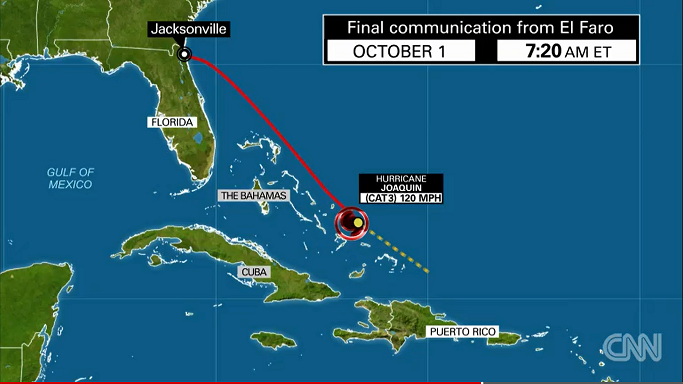I’m totally with Vittone on this one.
It’s not that there won’t be lots of little things, arranged in their own particular way, that makes this tragedy somehow “unique” from the others like it. There will likely be plenty of fresh lessons-learned contained in the various reports that could conceivably be useful or helpful to us and so, on that level, it is nominally “helpful.”
What I think Vittone said, very clearly, is that there won’t be any truly new revelations here, nothing that hasn’t been seen before numerous times. When we stare at the smaller details we completely lose sight of the bigger picture, and it was that bigger picture that got El Faro.
The distinction between a problem and a predicament needs to be understood. El Faro didn’t have a solvable problem or two that, once solved, would have allowed them safe passage. And that’s a very bitter pill for most people to swallow because we’re generally hard-wired to want in the worst way to identify and fix problems, thereby making things better/safer. Why wouldn’t we? Our lives may be on the line. It also makes us feel purposeful and good.
El Faro was, instead, in a predicament that they ultimately could not get out of: they wound up in close proximity to a storm with very deadly potential and as a result they needed everything to go right for them to make it out the other side. Their safety margin became steadily thinner with each mile they advanced, eventually becoming razor thin. Everything didn’t go right (they had a problem or problems) and they didn’t make it out. This predicament was largely of human origin, and no amount of equipment or survival training would have made a difference in this particular instance because of the strength of the storm and where they were in relation to it. If it was survivable, in the strictest sense, it would have required a miracle.
In the end it’s a relatively simple case of getting much too close to something that can easily kill you. Many times it won’t, but sometimes it will, and you can never be sure in advance when you’ll get away with it and when you won’t. Even if they had made it to San Juan in one piece with sea stories to tell it wouldn’t have changed the fact that it was still too risky. No one ever likes being told this, so mostly no one ever does.
The only sensible thing to do is use significantly larger safety margins when facing a high-consequence risk. That, however, costs time and money, up front, and gets to the real heart of the issue. Same for the Marine Electric, and the same for most others. I don’t have much confidence that this persistent pattern will change.
Why?
In 1986 NASA blew up the Challenger because they wouldn’t listen to the aerospace engineers’ warnings and chose to take chances they shouldn’t have. They had all the information they ever needed to avoid it, but just couldn’t help themselves.
In 2003 they did the same thing again with the Columbia. Sure, it was exterior tiles that time instead of booster o-rings. So what. Different technical problem, but the exact same decision-making failure (by some very bright people) as the last time that can be accurately paraphrased thusly: “yeah, we know there’s risk, but it’s always worked before. It’ll work again.” How many times have we all heard that one, or said it ourselves? It is a death trap for the ages, and will remain so.
If we can’t bring ourselves to stop taking such big unnecessary chances then we shouldn’t be surprised when we periodically get outcomes like El Faro. They’re baked right into the cake given general industry-wide attitudes about safety management. Everybody’s for it in theory. In practice, the ranks thin out pretty quickly, particularly as those up-front costs mount. There’s a pain threshold for everything, and everybody needs a pay check.
I don’t think that any true villainy or incompetence was at work here. Just garden-variety human-factor stuff. All the ISM Code in the world wouldn’t have stopped this one.

